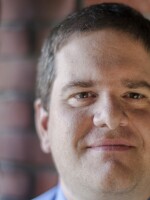SALEM, Ore. – Oone of the most active Northwest chapters of Toastmasters International is in a place where its members can’t actually go out in public. It's based at the Oregon State Penitentiary in Salem and the inmates who participate get the chance to practice their communications skills with a university debate team.
It’s going to be like any other debate. But at the end of the evening, half of the participants will go home. The other half will go back to their cells. The ones going home are students at Linfield College in nearby McMinnville, Oregon.
Their professor, Jackson Miller, has been organizing debates between students and inmates for four years.
"I think some of these guys have fewer opportunities on the inside to get positive reinforcement for arguing about issues that they care about."
Both teams have a mixture of inmates and students. Tonight's debate is over whether violent video games contribute to youth violence. Inmate Travis Ramsey was assigned to argue that yes, they do increase violence, much more so than, say, television.
“When I watch TV, I have the ability to see Hannibal Lecter and say ‘That’s a bad guy. I don’t like Hannibal Lecter. I don’t think I want to be a serial killer. Mom, I hope the cops catch Hannibal Lecter.’ I don’t have to play Hannibal Lecter and dig through the people’s guts and cut their heads off and wear their bodies as suits.”
Linfield junior Megan Schwab offered a rebuttal.
“So somehow I shot a person on Modern Warfare, now I know exactly how to operate an AK-47...”
And so on. Schwab’s team was eventually declared the winner. But Travis Ramsey says he thought he did pretty good, considering it was his first ever debate.
"I was nervous at first but I think I did extremely well," Ramsey says. "I liked the level of competition. I think I was even one of the best speakers that spoke tonight, and it made me feel real good."
Ramsey says he joined the debate team in hopes of improving his communication skills.
"As I get out and I further my life to make difference decisions, ones that (are) more positive, I play to use this communication as a skill, and I just wanted to hone it."
Ramsey does expect to get out soon. His release date is next summer. By then he'll have served about two years on a variety of charges, including heroin possession.
The prison debaters are headed up by Ron Edgemon. He says public speaking is a valuable skill even to prisoners like himself.
"Often times what brings somebody here is lack of communication. If you have a conflict with somebody, and you have better communication skills, sometimes you can actually resolve those."
It's a skill-set Edgemon wishes he had 15 years ago. That's when he shot and killed two men outside a bar in eastern Oregon. Edgemon claims it was self-defense, but he was convicted on two counts of murder and he's partway through a 25-year sentence.
"I wish I could bring those guys back," Edgemon says. "I can't. But what I can do is to try to help others any way that I possibly can."
He says that's why he's taken on a leadership role in the prison's Toastmasters Club. But prisoners aren't the only ones learning from the debates.
Student Megan Schwab is from Boise. She says it was eye-opening to talk with inmates about a shared passion: debate.
"They're discounted people in our society," she says. "You don't hear their voices, you don't hear their opinions. You don't know what they think or what they say. And pre-conceived notions. You're thinking of the bad guy or something like that."
But in the end, Schwab says, the inmates seemed to her like a bunch of regular guys.
On the Web:
Copyright 2012 Northwest News Network
Copyright 2012 Northwest News Network







